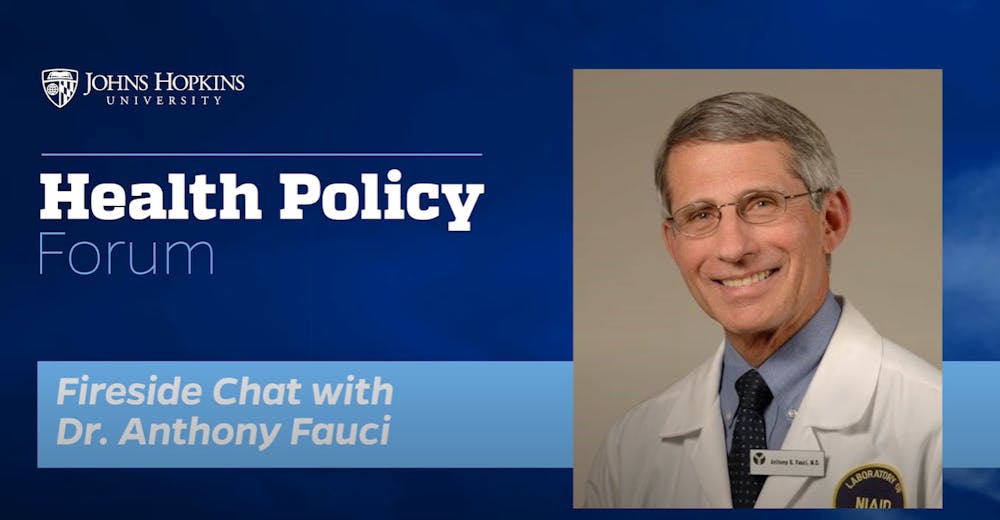Since the early stages of the COVID-19 pandemic, Hopkins has sought to publicize knowledge regarding the virus and measures to mitigate its spread among students, faculty, staff and the general public.
One of the earliest sources of information that the University created was the Coronavirus Resource Center. This began with the development of the COVID-19 dashboard, which was created by the Center for Systems Science and Engineering and broadcast information on the cumulative number of COVID-19 cases around the world.
The Coronavirus Resource Center’s website now includes testing data by state; information about vaccine development; and a detailed dashboard that now includes a U.S. map and a global map with data about active cases, incidence rate, case fatality ratio and testing rate.
On Oct. 16, the University launched its latest attempt at making information widely available: the Hopkins Health Policy Forum. The forum consists of a quarterly series of discussions co-sponsored by the Schools of Medicine, Nursing and Public Health and the Carey Business School with the goal of exploring the development and implementation of health policy interventions.
The first forum was hosted by the Bloomberg School of Public Health through a YouTube live event. It featured a discussion between Dr. Anthony Fauci, the director of the National Institute of Allergy and Infectious Diseases, and moderator Ellen MacKenzie, dean of the School of Public Health.
Fauci reflected on his experience with the public health efforts to fight human immunodeficiency virus (HIV) and acquired immunodeficiency syndrome (AIDS) during the early years of his career.
“Back then, [HIV] was perceived as a very restricted problem,” he said. “We had difficulty getting people mobilized to realize the potential impact of this because it did not affect people in a uniform way. It was a behaviorally related disease.”
He then related the global HIV/AIDS epidemic to the current pandemic.
“Two hundred fifteen thousand deaths in the United States, 7.8 million infections, over a million deaths worldwide, yet understandably there are people who look at the disease and say, ‘You know, if I’m a young healthy person, the chances are nothing is gonna bother me,’” he said. “They don’t want to participate in the control of an outbreak that for some people is a very serious threat.”
When asked by MacKenzie what he thinks is ahead of us in the next six months, Fauci expressed his concern about the winter.
“You can’t enter into the cool months of the fall and the cold months of the winter with a high community infection baseline,” he said. “We are going to start doing a lot of things more indoors rather than outdoors, and that is when you have to be particularly careful about the spread of a respiratory-borne disease.”
He reiterated what the public health measures everyone should follow for the control of the spread of COVID-19 are.
“There are about five measures that sound simple, but they are important because we know they work. One is the uniform wearing of masks or face coverings. Number two is to the extent possible, keeping distance. Number three is likely the most important. Avoid crowded places,” he said. “Fourth, do things, to the extent that you can, outdoors more than indoors, and if it is indoors, have good ventilation. Finally, washing your hands as often as you can.”
In an interview with The News-Letter, sophomore Public Health major Janey Song stated that she enjoyed how Fauci highlighted important aspects of the COVID-19 response.
“My favorite part of the talk was that he brought to people’s attention that you can’t live in a vacuum with just yourself,” she said. “Whether it be inadvertently, you can affect someone in the vulnerable population. As educated college students, we have the responsibility in our community to follow the guidelines so that we can keep everyone safe around us.”
Sophomore Breanna Soldatelli, a pre-med Neuroscience major, found the forum to be moving.
“I really liked when he said that everyone watching had the potential to be a future leader of America. We could be the scientists that solve this. We’re who they’re rooting for,” she said in an interview with The News-Letter. “It was pretty inspirational to see up close and personal all the work that is going on and how we can help.”





